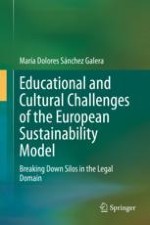2020 | OriginalPaper | Buchkapitel
5. Facing Cultural and Education Challenges at the EU Level: Fragmentation and Multiple Solutions
verfasst von : María Dolores Sánchez Galera
Erschienen in: Educational and Cultural Challenges of the European Sustainability Model
Aktivieren Sie unsere intelligente Suche, um passende Fachinhalte oder Patente zu finden.
Wählen Sie Textabschnitte aus um mit Künstlicher Intelligenz passenden Patente zu finden. powered by
Markieren Sie Textabschnitte, um KI-gestützt weitere passende Inhalte zu finden. powered by
